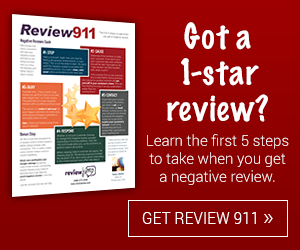
There are three certainties in life– death, taxes, and Google updating its search engine results.
Google’s own review platform is robust and useful. Last year, I conducted a large study on Google reviews and how they may affect your search engine results. The evidence is pretty clear. Needless to say, Google cares about reviews just as much as we do.
But, here’s something that may surprise you– Google cares about reviews on other platforms, as well. They care so much, in fact, that they’re incorporating reviews from third party platforms into their own knowledge graph results.
As long as the business has its review snippet markup completed correctly, and meets Google’s criteria, it’s eligible to display reviews from around the web in its knowledge graph entry.
So, this only comes in handy if a potential customer is directly searching for your business. These extra reviews don’t seem to appear in Google’s local search three pack, even if you expand a business’ entry.
Still, it’s a powerful tool, since your customers often do seek you out by name– and you want to show them the best results possible, including aggregating good reviews from around the web.
Reviews From Around the Web
Let’s take a look at what these extra reviews look like and how they work.
I want to use auto dealerships as an example, simply because I know how important strong reviews across various platforms are in the auto sales industry. Competition is high, and customers are looking for service just as much as they’re looking for a certain make and model.
When someone’s making a big ticket purchase, they’re likely to consider more than just a couple of Google reviews.
Historically, they’d have to seek out reviews on Google, Facebook, Yelp, DealerRater, and other platforms separately. But now, Google puts them all in one place.
If you have all of your ducks in a row, and your reviews are consistently great across the web, then Google has good news for you.
Here’s what my search for ‘Lithia Ford Boise’ brought up:
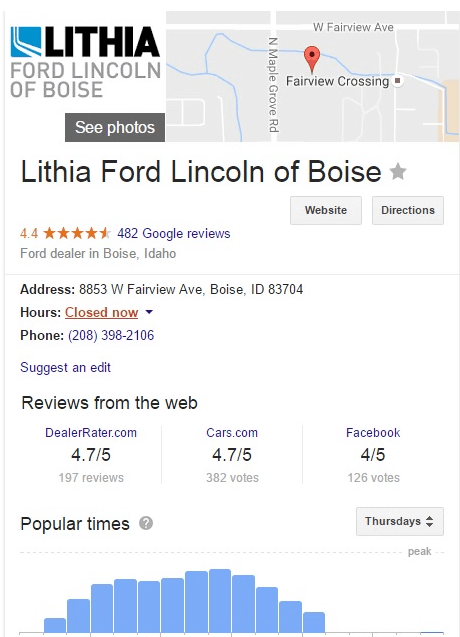
This knowledge graph entry has a prominent place on the right hand side of the search results. It’s impossible to miss.
Notice how, in addition to Lithia’s 4.4 star Google rating, the results also show us Lithia’s score on DealerRater, Cars.com, and Facebook.
That immediately adds credibility to their dealership in the search results, and their good reputation is apparent to anyone looking to buy a vehicle. Any given user can click on DealerRater, Cars.com, or Facebook to see those reviews.
It’s right there on the first page of Google, and you don’t even have to scroll down.
Lithia has a great reputation, but they also have all their ducks in a row. Their Google My Business profile is set up correctly, they’ve correctly implemented Google’s review markup, and they meet Google’s criteria.
Now, let’s look at another example.
Here’s what I got from searching ‘Subaru Boise.’
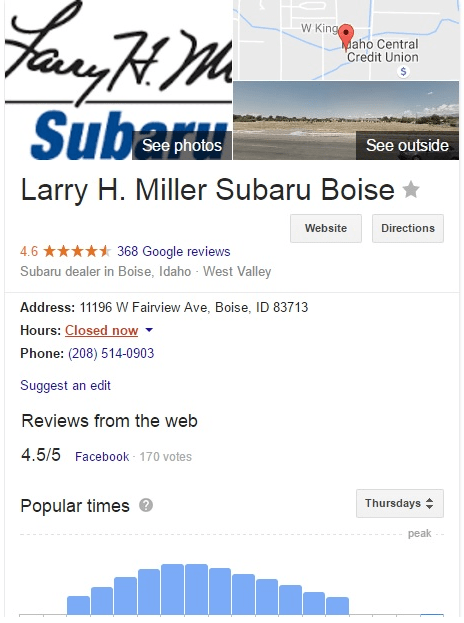
Now, this wasn’t a branded search, but it did bring up Larry H. Miller Subaru in Boise. It shows their Google reviews and their Facebook reviews.
It intrigued me that a non-branded search brought up Larry Miller, so I then performed a search for “Larry H. Miller Boise,” which brought me this:
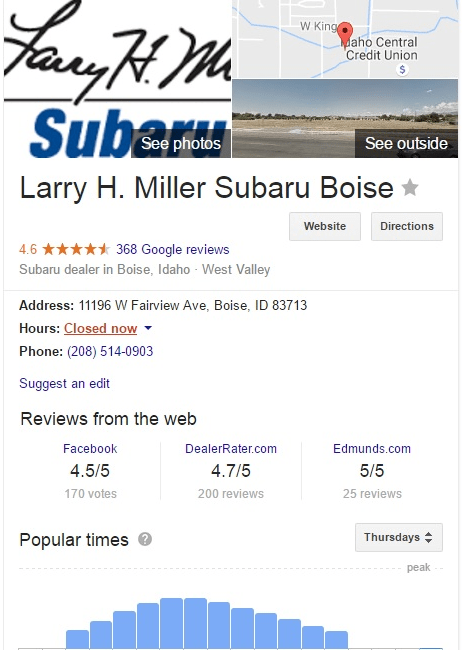
With a branded search, we can also see reviews from Edmunds and DealerRater, as opposed to just Facebook and Google.
So, even if your customers aren’t doing a branded search, they may see some different results in ‘reviews across the web.’
I suggest you button up your review markup and make sure your reviews are in order.
If you don’t, your knowledge graph entry might look like this:
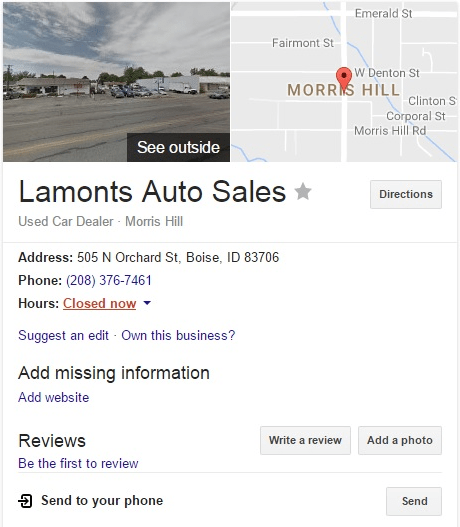
Be honest– which of these search results looks better to you? Which one will look better to your potential customers?
Clearly, it’s worth the extra time to jump through Google’s hoops, set your review markup, and boost your reputation right there on the right hand side of the search results.
There’s another way you may be able to squeak out some extra reputation in the search engine results, too.
Critic Reviews
Critic reviews can also appear in the search results. If you’ve made a top 10 list, or have received a review from a professional critic, you can apply to add that review to your knowledge graph entry.
In fact, critic reviews got Google to add ‘reviews around the web’ in the first place. Review platforms like Yelp and TripAdvisor complained that regular people’s voices weren’t being heard, while professional voices were.
Google altered the search engine results accordingly, giving us “reviews from around the web.”
Google is currently only working with a set number of partners for critic reviews but if you’ve made a top 10 list or have been rated in a reputable publication it’s worth checking out Google’s guidelines and applying to have your review or award added to your knowledge graph entry.
Get the Ball Rolling
So, if you’re not seeing “reviews from around the web” on your knowledge graph entry, you have some work to do.
The list of criteria for displaying your chosen reviews sites is pretty simple:
-Ratings must be sourced directly from users.
-Don’t rely on human editors to create, curate or compile ratings information for local businesses. These types of reviews are critic reviews.
-Sites must collect ratings information directly from users and not from other sites.
As long as your Google My Business listing is set up properly, and your chosen review sites meet those guidelines you’re ready to go.
And you have some work ahead of you.
You need to implement Google’s review snippet markup.
If you’re not already a code or web-savvy person, I suggest getting someone to do it for you. If you do marketing for or own a medium or large auto dealership, for example, you probably have a web developer on retainer.
If not, you’ll need to hire someone. You can do this yourself, in theory. All of the information you need is readily available. It’s just very time consuming, especially if you don’t have any experience with this kind of thing.
But it’s absolutely worth it. Anything that gives your potential customers access to your solid reputation across multiple platforms puts you one step closer to a sale.
If you use this to your advantage, it could be huge.
A Note on Yelp
One more quick note before I let you go– Yelp doesn’t appear to be showing up on “reviews from around the web.”
But that doesn’t mean you can ignore Yelp.
Your potential customers still likely use Yelp to read reviews, and Yelp is likely to show up in the first page of search engine results for many businesses. You still need to cultivate good reviews on Yelp, even if your score isn’t showing up in the knowledge graph.
Updates like this one show that Google wants to provide great search results for the average consumer. But it also shows that Google is willing to throw business owners a bone, as well. Since the web is an extremely competitive marketplace, we all need to take advantage of every bit of Google knowledge we can get.
So, go ahead and get those reviews listed right in the search results while your competitors are still catching up on last year’s news.
Thanks for reading!
-Brodie






